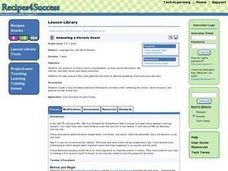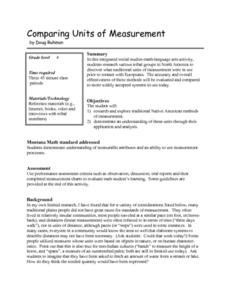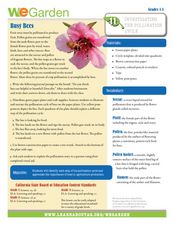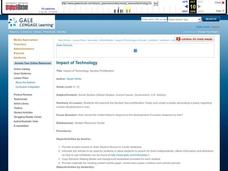Curated OER
Animating a Historic Event
Research a historic event using textbooks, primary source documents, the Internet, and other library and media resources. Young historians will take the research they have gathered and write an attention-grabbing, historically accurate...
Curated OER
What Happened to the Water? Designing Ways to Get and Clean Water
Students design ways to clean a water source or find a new water source depending on various hypothetical family scenarios. They draw and write about how to provide water to a community facing a water crisis, and present their solutions...
Curated OER
TE Lesson: Pollution Solutions
Students study how industrial technology helps clean up and prevent air pollution. They role play as engineers to examine methods of engineering pollutant recovery methods such as scrubbers, electrostatic precipitators, cyclones, and...
Curated OER
Can You Rhyme?
First graders combine locomotive skills and rhyming skills to learn about rhyming pairs. They actively participate in the learning process.
Curated OER
Grade 5: Multiple Towers
Fifth graders use interlocking cubes to build towers to represent factors of numbers and place the towers in the appropriate places on a Tower chart in order to look for patterns. They work in partner groups, and finish by writing...
Curated OER
Comparing Units of Measurement
Fourth graders investigate the units of measurement used by various Native American tribes before they had contact with the Europeans. They write research questions, conduct research using a variety of resources, in small groups write a...
National First Ladies' Library
How a Bill Becomes a Law
High schoolers engage in the democratic process and to learn how a bill become a law. Then they write a bill they would like as law in their classroom. Students also form committees that will review the list of bills to determine if they...
Curated OER
Journalism and Responsibility
Students explore the world of journalism. In this media awareness lesson, students investigate the roles and responsibilities of journalists. Students watch segments of videos and research websites to inform them prior to writing their...
Curated OER
Portrait of Nadine Dumas
Students explore a portrait and then create their own portrait as a gift. In this bust art lesson, students use model techniques to create a three dimensional bust portrait. Students analyze the elements of the design and write about...
Curated OER
Busy Bees
Young scholars explore the pollination cycle. In this pollination lesson, students investigate the process of pollination. Young scholars illustrate the pollination cycle of bees on paper plates.
Curated OER
Technology
Students trace and analyze the impact of the atomic bomb on warfare, society and government. They apply this process to other more modern technological inventions in our lives.
Curated OER
Oh, Baby!
Learners explore one's goals and dreams using a combination of research and imagination. They produce a web site that portrays a vision of one's future. They plan, conduct and write up an informal journalistic interview.
Curated OER
Separation of Powers
Students examine the separation of powers in local and federal government. Using case studies, they review several instances of separation of powers. After reading the case studies, they write a brief opinion essays supporting their...
Curated OER
Feast For 10
Young scholars complete a variety of activities related to the book "Feast For 10" by Cathryn Falwell. They read the book and follow the recipe for pumpkin pie from the story. Students then write about their cooking experience,...
Biology Corner
Random Sampling
Simulate a random sampling of data by tearing 20 sheets of paper into slips and place a number on 10 and a letter on 10. They place the slips in two separate containers and randomly draw a number and a letter. They record their...
Curated OER
Segmenting and Blending with Word Families
Students sound out CVC words. In this literacy lesson, the teacher guides students through the process of sounding out three-letter words with a as the middle vowel using both repetition and movement. Then students complete a worksheet.
Curated OER
Where Do Things Come From?
Second graders examine the recycling process. In this recycling lesson, 2nd graders discuss the reasons for recycling and create storyboards to show where a specific material comes from. Students complete a worksheet as a follow-up...
Curated OER
Hard Times, Soft Sell
Students analyze art to determine themes for the Great Depression Era. In this Great Depression lesson, students identify themes for the era and research evidence for the themes to present to the class. Students interview family members...
Curated OER
A Look Through My Antonia's Eyes
Young scholars explore life as a pioneer in the late 1890's. In this appreciation of history lesson plan, students read excerpts from My Antonia. Young scholars create presentations about life and culture in Nebraska. Students write an...
Curated OER
Pleistocene Mammals
Students research the causes of the extinction of Pleistocene mammals. In this Pleistocene mammals lesson, students read essays to understand the Pleistocene epoch. Students write an essay about the personal impact of this epoch.
Curated OER
Changing Bodies
Seventh graders listen to a poem about how a teen feels not understanding what is happening inside his body. In this health activity, 7th graders label the endocrine glands and put sex characteristic cards in the order they think they...
Curated OER
My School Goal (Part1)
Third graders share their accomplishments and how they felt when they reached their final goal. In groups, 3rd graders brainstorm ideas and goals. They discuss personal goals, both short term and long term. They list steps in...
Curated OER
Mystery Math
Here is an interesting "trick" your young mathematicians can perform. They are taught how to find any number's "digital root," by following a set of detailed instructions. The process works for any number, and is the type of math puzzle...
Curated OER
KG Lesson Plan
Eighth graders explore the four major components of an autobiography. As they discuss the major characteristics of an autobiography, 8th graders list the advantages and disadvantages of traditional, word of mouth, tales. Individually,...
Other popular searches
- Writing Process Steps
- Four Steps of Writing Process
- Writing Process Steps Web
- 42 Writing Process Steps
- The Writing Process Steps

























